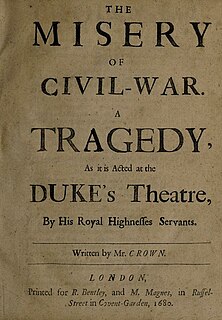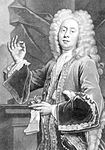
The Duke's Company was a theatre company chartered by King Charles II at the start of the Restoration era, 1660. Sir William Davenant was manager of the company under Prince James, Duke of York's patronage. During this period, theatres began to flourish again after being closed due to restrictions throughout the English Civil War and Interregnum. The Duke's Company existed from 1660 until 1682 when it merged with the King's Company to form the United Company.
Herod and Mariamne is a 1671 tragedy by the English writer Samuel Pordage. It was first performed by the Duke's Company at the Lincoln's Inn Fields Theatre in London shortly before they moved to the Dorset Gardens Theatre. It was the company's attempt to respond to the great success of John Dryden's heroic drama The Conquest of Granada by the rival King's Company. It is inspired by the accounts of Josephus portraying the reign of Herod II.
The Adventures of Five Hours is a 1663 comedy play by the English writer Sir Samuel Tuke, 1st Baronet. Based on the play Los empenos de seis horas by Antonio Coello, It is an early example of the developing Restoration comedy tradition. Its success led to a series of sentimental plays in the Spanish style about love and honour, very different to the more sophisticated and cynical comedies which the Restoration era became known for.
The Slighted Maid is a 1663 comedy play by the English writer Robert Stapylton.
The English Princess; Or, The Death Of Richard The Third is a 1667 tragedy by the English writer John Caryll. It is set around the downfall of Richard III. It was performed at Lincoln's Inn Fields by the Duke's Company. Although the full cast is unknown it included Thomas Betterton as Richard III, Henry Harris as Duke of Richmond and William Smith as Sir William Stanley. In his diary Samuel Pepys described it as a "a most sad, melancholy play, and pretty good; but nothing eminent in it, as some tragedys are" At the end of the show actress Moll Davis came on stage to dance a jig and announcer the next day's performance.
Squire Oldsapp is a 1678 comedy play by the English writer Thomas D'Urfey. Staged by the Duke's Company at the Dorset Garden Theatre in London, the original cast included Thomas Betterton as Welfore, William Smith as Henry, John Crosby as Lovell, James Nokes as Squire Oldsapp, Anthony Leigh as Sir Frederick Banter, Samuel Sandford as Colonel Buff, Cave Underhill as Pimpo, Emily Price as Christina and Elizabeth Currer as Madame Tricklove.
The Country Wit is a 1676 comedy play by the English writer John Crowne, part of the tradition of Restoration Comedy. It was first staged at the Dorset Garden Theatre in London by the Duke's Company. The cast included Samuel Sandford as Sir Thomas Rash, Thomas Betterton as Ramble, James Nokes as Sir Mannerly Shallow, Henry Harris as Merry, Cave Underhill as Booby, Matthew Medbourne as Lord Drybone, Anthony Leigh as Rash, Mary Betterton as Lady Faddle, Mary Lee as Christina, Elizabeth Currer as Betty Frisque and Elinor Leigh as Isabella.

The Counterfeit Bridegroom; Or, The Defeated Widow is a 1677 comedy play. The work's authorship is usually credited to Aphra Behn has been alternatively been attributed to Thomas Betterton. It was inspired by Thomas Middleton's Jacobean play No Wit, No Help Like a Woman's.

The She-Gallants is a 1695 comedy play by the English writer George Granville. It was first staged by Thomas Betterton's Company at the Lincoln's Inn Fields Theatre in London.

The Comical Revenge; Or, Love In A Tub is a 1664 comedy play by the English writer George Etherege. First staged by the Duke's Company, it premiered at the Lincoln's Inn Fields Theatre. It is one of the earliest Restoration Comedies.

The Misery of Civil War is a 1680 tragedy by the English writer John Crowne. It was originally staged by the Duke's Company at the Dorset Garden Theatre in London. The play was staged at the height of the Popish Plot, something Crowne addressed in his prologue. Although he states that "by his feeble skill 'tis built alone, The Divine Shakespeare did not lay one Stone" the plot in fact drew heavily on Henry VI, Part 2 and Part 3
The Massacre of Paris is a 1689 tragedy by the English writer Nathaniel Lee. It was first staged by the United Company at the Theatre Royal, Drury Lane. It is based around the 1572 St. Bartholomew's Day massacre which led the killing of many Huguenots during the French Wars of Religion. The events had previously been portrayed in Christopher Marlowe's Elizabethan play The Massacre at Paris.

The Empress of Morocco is a 1673 tragedy by the English writer Elkanah Settle. It was originally staged by the Duke's Company at the Dorset Garden Theatre in London. The cast included Henry Harris as Muly Labas, William Smith as Muly Hamet, Thomas Betterton as Grimalhaz, Matthew Medbourne as Hametalhaz, John Crosby as Abdelcador, Mary Betterton as Laula and Mary Lee as Mariamne. The published version was dedicated to Henry Howard, Earl of Norwich.

The Villain is a 1662 tragedy by the English writer Thomas Porter. It was originally staged by the Duke's Company at the Lincoln's Inn Fields Theatre in London. The first cast included Thomas Betterton as Monsieur Brisac, Henry Harris as Monsieur Beaupre, John Young as Bontefeu, Samuel Sandford as Maligni and Mary Betterton as Bellmont. William Davenant wrote the epilogue.

Theodosius; Or, The Force Of Love is a 1680 tragedy by the English writer Nathaniel Lee. It was first staged by the Duke's Company at the Dorset Garden Theatre. It takes place during the reign of the Roman Emperor Theodosius II. Incidental music for the play was composed by Henry Purcell.
The Destruction of Troy is a 1678 tragedy by the English writer John Banks. It was first staged by the Duke's Company at the Dorset Garden Theatre in London. It depicts the Trojan War as inspired by Homer's Iliad.

Love Triumphant; Or, Nature Will Prevail is a 1694 tragicomedy by the English writer John Dryden. It was Dryden's final stage play.

Circe is a 1677 tragedy by the English writer Charles Davenant. It was first staged by the Duke's Company at the Dorset Garden Theatre in London. The play's music was composed by John Banister.

Troilus And Cressida; Or, Truth Found Too Late is a 1679 tragedy by the English writer John Dryden. It was first staged by the Duke's Company at the Dorset Garden Theatre in London. It was a reworking of William Shakespeare's 1602 play Troilus and Cressida, set during the Trojan Wars. In acknowledgement of this Dryden has the prologue spoken by Shakespeare's ghost, defending the alterations made to the play.

Sir Salomon; Or, The Cautious Coxcomb is a 1670 comedy play by the English writer John Caryll. It has often been staged under the title Sir Solomon Single. It was first performed by the Duke's Company at the Lincoln's Inn Fields Theatre in London. It is part of the tradition of Restoration comedy.













